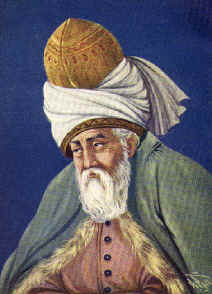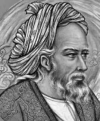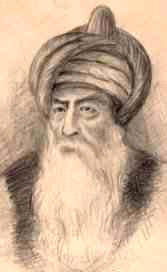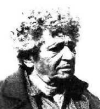| |
Turkish Humanism and
Anatolian Dervishes, Turkish Philosophers
Hacı Bektaş-i
Veli
Khorasan Dervishes , including “Hacı Bektaş-i
Veli” the great Turkish thinker, had mixed up in the same culture, Christian
communities living in Anatolia with Turkmen groups come by immigration, through
activities of education and reconstruction and had not played a vital role in
creation of cultural integrity in Anatolia and constitution of Central
Authority. A number of Dervishes who had come to Anatolia by way of immigration
settled in secluded road junctions, opened lodges (Zaviye) there, and these
institutions established on unsettled territories had been converted into
centers of culture, reconstruction and religion in time. Thus religious
communities had been spread out everywhere; rules of ethic, decency, behaviour,
belief had been standardised, knowledge and science had been produced and
expanded in these centers within the framework of availabilities of the era.
That these Dervishes had settled in villages and cultivated soil and dealt with
education had been also supported by Rulers, and a number of privileges had been
granted to Dervishes. Consequently lodges had been set up even at the most
remote corners of Anatolia and a common cultural texture had been commenced
forming thanks to the education provided. One of Khorasan Dervishes who had
arrived in Anatolia is “Hacı Bektaş-i Veli”. “Hacı Bektaş-i Veli” was born in
1248 in Nishabur city of Khorasan in Iran and spent his childhood and youth in
Khorasan; learned philosophy, social and technical sciences in “Hoca Ahmet
Yesevi” Center and after travelling and studying Iran, Iraq, Arabia arrived in
Anadolia in 1275/80 and settled in Hacıbektaş (formerly called Sulucakarahöyük).
In that era Anatolia had been crushed under Mongolian invasion on the one part
and had faced with great political and economic crisis as well as struggles of
throne on the other part. “Hacı Bektas-i Veli” who had settled in
Sulucakarahöyük in such condition improved his philosophy and began to educate
students. His system of thought based on tolerance and love of human being had
spread shortly to masses of great people in Cappadocia which had been a greet
center of Christianity and adopted by the people.
The end of path not leading science is dark,
Educate women,
Control your hand, waist, tongue !
The greatest book to be read is human being
Honesty is the door of friendship,
The quality of a spiritual teacher is to give, not to receive,
Universe is within Adam, Adam is within the Universe,
Science is the light illuminating roads towards the reality,
The end of road not led by science is dark,
Our way has been established on science, knowledge and love of human,
Clean up your dwelling place, deserve the money you earn,
Let us unite together, let us be huge, alive,
Do not hurt even if you were offended,
Whatever becomes heavy for your own personality, do not make it applied to
anybody,
Happy is those who enlighten the darkness of thought,
Be mediator,
Perfection of a person is the beauty of his words,
Always bear in mind that even your enemy is a human,
The biggest miracle is to work,
Male, female are not questioned in the language of love.
Everything created by God is placed orderly.
Woman and man are not different according to us.
Deficiency, shortness are in your views.
His philosophic thought has been based on
existence of human being and love of human being. This thought has been
reflecting the same understanding with 1948 Human Rights Universal Declaration.
Thoughts of “Hacı Bektaş-ı Veli” have been taken into consideration in 1923 by
M. Kemal Atatürk approximately after 600 year, and a republic which is secular,
democratic, respectful to human rights has been established. Despite such a long
time passed, his thoughts have been preserving their effectiveness and
proceeding to enlighten the path of humanity.
Temperature is in fire, not in sheet iron,
Miracle is in coat, not in crown,
Whatever you look for, look for within yourself
Not in Jerusalem, Mecca, Pilgrimage.
“Hacı Bektaş-ı Veli” who made a statement as “
Difference in religion is unnecessary. In fact all religions are intended to
establish peace and brotherhood in the World.” Has been setting forth all of his
views in his work called “Velayetname”. The primary objective “Bektaşilik”
(following ideas of Bektaşi) established on the basis of such system of thought
of “Hacı Bektaş-ı Veli” is to perceive unity of “Universe-God-Human” which is
basically formed by love. Human being is a creature of love. Human being has
been provided with divine (God-Like) qualifications. Initial phase of success is
that human being should know and love himself/herself; because human being
carries in himself/herself a divine gist and an individual who loves
himself/herself loves also God. The perfect expression of love of God in
“Bektaşilik” has been found in the best manner in the following quatrain:
Their apprentices chip stone
After chipping present it to their Master
Mention the name of “God”
In every piece of that stone.
Human being is an independent creature in
his/her living environment. His/her duty is to behave modest, to purify his/her
core, to be mature, to remain far from showing-off and to be full of love of
God. Humanly bodies are only a mean for attaining an objective. Therefore to
divide people as Woman and Man, or to despise them according to their social
positions or their races are the biggest fault that can be performed. Women and
Men, all human beings are equal. Thoughts of Hacı Bektaş-ı Veli have been
prevailing still today and have been celebrated with great enthusiasm every year
on dates of 15-16-17 August in township of Hacıbektaş of Nevşehir province.
Akhism
One of Institutions which has been effective in attaining Anatolia’s cultural
unity as referred above is the Organisation of Akhi (Ahilik). The Akhis who came
in Anatolia together with “Yesevi” Dervishes settled themselves in urban areas
rather than rural areas since they had a profession to work on. Organisation of
Akhi, being a professional organisation, is an Interior (Batıni) Establishment.
“Ahi Evran Veli”, one of Khorasan Dervishes as “ Hacı Bektaş-ı Veli”, ensured
that Akhis of Anatolia become an organised power. Wife of “Ahi Evran” had been
known as “Fatma Bacı Kadın Ana” and established Organisation of “Bacıyan-ı Rum”
which was the first women organisation in the world. Akhis who had assembled in
13th Century in Ankara and Kırşehir under the Sheikhship of “Ahi Evnan” spread
out shortly to Seljuk Cities. In foundation of the Ottoman Empire Akhis had
played rather important role, and according to some sources they had attached
“Osman Gazi” who was the founder of Ottoman Empire, his son “Orhan Gazi” and
Murad-I the 3rd Sultan to their sides.
General basic principle in Akhism (Ahilik) is absolute equalities of those who
are the member of the Organisation. All members are brother of one another.
However, there are an eternal respect hierarchically from young to older
members. A candidate for membership is to be proposed by one of members in the
Organisation. Those who are engaged in degrading works, known in the vicinity as
unfavourable, thought to bring defaming words against the Organisation cannot be
Akhi. For example those who killed somebody, killed animal (butchers), thieves,
those whose adultery was proved cannot participate in the Organisation. Entrance
into the Organisation is performed through a special ceremony like membership to
the Organisation of “Bektaşilik”. In this ceremony a special kind of belt (Þed)
is worn by candidate of Akhi and advised that he must show love and respect to
all humanity, and be true and honest. The organisation requires that all members
have absolute loyalty and endless obey towards the Organisation. Atheists can
never be a member to the Organisation, however devoted religious persons are not
also allowed to participate in the Organisation. As was the case in the
Organisation of “Bektaşi”, members are subjected to such phases as to get
knowledge, patience, purification of soul, loyalty, friendship, tolerance, etc.
In addition to have such features six important principles of Akhism are:
1. Keep your hand open,
2. Keep your dining-table open,
3. Keep your door open,
4. Keep your eyes tied,
5. Control your waist,
6. Hold your tongue.
Whoever praying patience with devout in God
Came to us is our member.
Whoever working with wisdom and moral
Exceeded us is our member.
Certain phases are applied in Akhilism. In these phases disciple is taught
professional skills, mysticism and religious information, reading and writing,
Turkish, Arabic, Persian, music, mathematics and information about military as
well as “Fütüvvetname” of a nature as the constitution of the Organisation of
Akhi (Brotherhood). There is a system with nine ranks in the Organisation of
Akhi, namely:
1- Valiant,
2- Assistant,
3- Apprentice,
4- Foreman,
5- Master,
6- Akhi,
7- Caliph,
8- Sheikh,
9- Sheikhulsheikh.
Although Organisation of Akhi has ceased to exist today, it has been celebrated
officially with the Week of “Akhi Cultural Celebration” on the second Monday of
the Month of October every year.
Mevlana
Another great scholar in Anatolia who enlightened the humanity is however
“Mevlana Celaleddin Rumi”. “Mevlana was born in 1207 in Khorasan, died in 1273
in Konya. He received his first lessons from his father “Bahaeddin Veled” known
as “Sultan of Scholars”. “ Mevlana” who had grown up complete with the thought
of mysticism came across with “Şems Tebrizi” who was an Akhi and then his own
thoughts started to take form. Mevlana’s ability to express his thought of
mysticism through poetry helped him to be well known even today in all over the
World.
Non-priority is branch of love, root in endlessness.
This greatness does not fit this wisdom, moral.
Be disappear, give up your existence, Your existence is crime.
Love is nothing but to find the true path.
According to Mevlana the most important thing
which is necessary for reaching the God is love. A plant, animal may be also
loved; however, the only creature that is capable of loving with its body,
conscious, thought, memory altogether is human being. Mevlana praised the love
felt for a woman; because a person who is capable of loving another person is
able to love himself, all human beings, universe and the God. And the best of
all loves is the love of “Reality” which starts when attained to this knowledge.
“Sema” which has performed by “Mevlevi” dervishes by whirling is to reach an
agreement with all the World in love, to keep pace with its universal whirling.
The fact that one hand faces the sky and the other to the Earth is to present
love received from the God to all the World. Soul is a core jetting out from the
God, it is immortal. Soul is desirous to turn back to its source, to the God.
Sound coming from “Reed” (Ney) is the sound of soul full of sadness, desiring to
turn back the initial source. “Mevlana” has expressed that the Universe was the
endless field of existence of the God and that human being carried a God-Like
quality as a part of a whole by saying “ Hey, whoever looks for the God, it is
you what you look for…”
Come whatever you are, come
Whether you are atheist, or worship fire,
Whether you have broken your oath thousand times
Our convent (Dergah) is not the convent of despair,
Come whatever you are, come again
As would be seen in the foregoing verses, “Mevlana” believed in brotherhood of
all humanity and difference among religions would not be related with the
God-Like presence. “Mevlana” attached great importance to women, by stating “ As
long as you wanted that women should cover themselves with clothes, you would
stimulate the desire in everybody to see them. If heart of a woman is good, like
a man, whatever ban you put into practice she will lead to the way of goodness.
If your heart is bad, whatever you do, you can never affect her.” Mevlana
advocates equality of a woman with a man. Students of Mevlana were called
“Kitap-el Esrar” (Clerks of Secret), among who had been included Muslims, Jews,
Christians, Greeks, Iranians, Arabians, Armenians, Turks. Poems of Mevlana were
collated by his Students consisting of so many different religion and
nationality and have been arrived up to the present day
|
|











